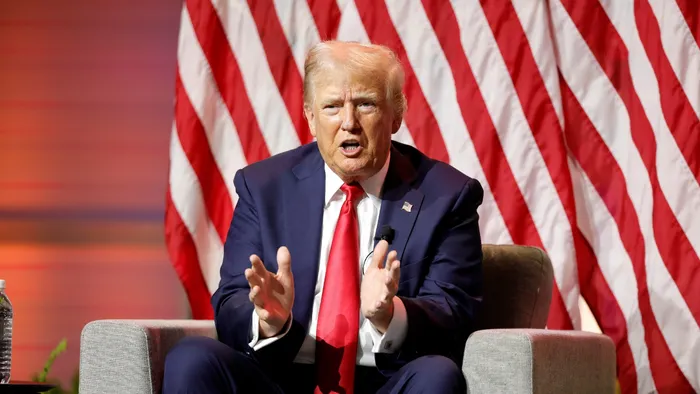
US President Donald Trump has claimed that producers and studios were being “lured” to foreign locations, drawn by appealing production deals that, in his view, pose a threat to national security.
Image: Kamil Krzaczynski / AFP
South Africa’s reputation as a world-class film destination could face serious repercussions if US President Donald Trump’s latest policy proposal becomes reality.
On Sunday evening, Trump declared that he would be directing the Department of Commerce and the US Trade Representative to impose a 100% tariff on all films produced outside of the United States.
Between November 2023 and June 2024, foreign film production investments in South Africa totalled R2.52 billion, with projections exceeding R5 billion by October 2025.
From November 2023 to August 2024, international production crews booked over 59 000 hotel bed nights, injecting nearly R148 million into South Africa’s hospitality industry, with an average spend of R2500 per night.
According to Bobby Amm, CEO of Commercial Producers Association South Africa (CPASA), it has been estimated that for every Rand spent on film production in South Africa, an additional R2.50 is generated in the local economy, with additional spending on transport, dining, and recreation highlighting the significance of foreign filmmakers as high-value business tourists.
The film industry created 26 573 jobs for local freelance crew members and performers over eight months in 2024.
If implemented, these tariffs could have far-reaching implications for international film hubs like South Africa, where Hollywood has increasingly turned to shoot films thanks to favourable incentives, lower costs, and skilled local crews.
The announcement has sent ripples through the global film industry, raising fresh concerns about the future of cross-border productions and the economic ties that underpin them.
The film sector was left reeling after Trump’s announcement, made via a post on Truth Social, in which he lamented what he described as the rapid decline of the American film industry.
He claimed that producers and studios were being “lured” to foreign locations, drawn by appealing production deals that, in his view, pose a threat to national security. His message ended with the emphatic rallying cry: “We want movies made in America, again!”
The issue of “runaway production” - US studios choose to shoot films abroad to save costs—has become a hot topic over the past year, especially in the wake of the 2023 Hollywood strikes.
These disruptions pushed many studios, including independents and streamers, to seek more affordable and stable shooting environments, including South Africa, Eastern Europe, and Canada.
While the US has long grappled with productions leaving states like California due to soaring expenses, international locations have benefited from this shift. South Africa, in particular, has enjoyed a surge in international filming thanks to its generous rebate schemes, skilled crews, and diverse locations.
Trump’s proposal did not include television productions and did not mention whether the tariffs would apply to post-production services, many of which are also outsourced internationally.
He also did not clarify whether American films shot partially overseas would be subject to these tariffs or how such levies would be calculated.
Complicating matters further is the fact that films, now largely digital products, fall under a World Trade Organization (WTO) moratorium that prohibits tariffs on digital goods. This raises questions about the feasibility of the proposal and how it would be enforced under international trade law.
Adding to the confusion is Trump’s appointment of so-called “special ambassadors to Hollywood” – actors Mel Gibson, Sylvester Stallone, and Jon Voight—whose roles remain undefined.
Gibson recently told Fox News that it was cheaper to fly an entire crew to Europe for a three-day shoot, including accommodation, than to shoot a single day in Los Angeles.
Should Trump’s proposed 100% tariff come into effect, American distributors may also face retaliation. International buyers of US films could be subject to similar reciprocal tariffs, potentially sparking a trade spat within the global entertainment industry.
For countries like South Africa, which have carved out a niche as affordable and efficient production destinations, the proposed tariffs could mean fewer inbound projects and a significant blow to local film economies.
Cape Times
Related Topics: